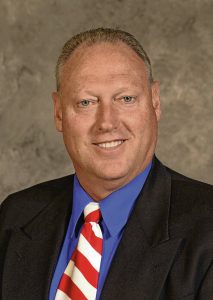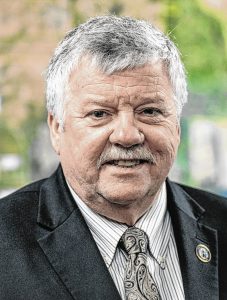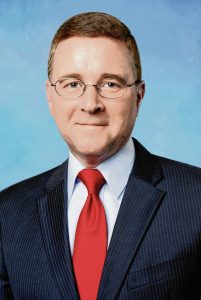
Franklin’s plan to expand Scott Park may take longer than expected now that Senate Enrolled Act 1, which brought property tax cuts to local governments, was passed.
Daily Journal File Photo
Local officials in Johnson County are forging a new path forward after a newly passed state law is expected to strip the county of $28.2 million in revenue to bring property tax relief to residents.
Senate Enrolled Act 1, authored by Sen. Travis Holdman, R-Markle, was signed into law by Gov. Mike Braun on April 15. Among other changes, the bill phases out and replaces the homestead standard deduction and other property tax deductions with credits, makes the maximum levy growth quotient percentage cap at 4% in 2026 and raises the threshold for business personal property tax exemption from $80,000 to $2 million by 2026.
The Indiana Capital Chronicle reported April 15 that homeowners would largely save on property taxes with a credit for 10% off every homestead’s bill up to $300 each. However, with local units of government potentially raising or implementing a local income tax, or LIT, it is unclear how much tax relief residents will actually get.
Some local municipal officials like in Whiteland, New Whiteland and Prince’s Lakes said it was too early to talk about the ramifications of the newly signed law and they needed more information on what the effects would be. However, Johnson County, Franklin and Greenwood officials told the Daily Journal they were disappointed and frustrated over how local governments will be impacted by the changes.
Problems with the law

Johnson County Commissioner Brian Baird felt like state lawmakers didn’t listen to concerns and he believes a better tax relief plan could’ve been created. Baird was frequently at the Statehouse and constantly communicated with state officials, he said.
“They didn’t ask us to help them fix the system. They decided to make a decision to do something that they had no clue what they were doing,” Baird said.
Baird also felt like commissioners were “thrown out there to the wolves” by state officials for allegedly over-spending money but county councils often make financial decisions for counties. There are also other elements of spending that commissioners can’t control, like the state-controlled judicial system and elected officials who make their own decisions.
Additionally, only a small portion of property taxes go to the county government, Baird said. Property tax funds are spread out among the libraries, school districts, special units, townships and the county. Johnson County also must provide recorder, auditor, treasurer and surveyor services to cities and towns, which comes out of the county’s funding.
With SEA 1, counties that spend money efficiently like Johnson County are roped in with counties that don’t, Baird said.
“What they don’t consider is in what they’re doing and how they’re doing it, they’re cutting off our finances as well as they’re cutting off those that haven’t done it properly,” Baird said.
Greenwood Mayor Mark Myers shared similar frustrations with the new legislation and said he and other mayors have been involved in multiple meetings at the Statehouse. He feels like state lawmakers wanted to give Braun what he’s asking for but hurt local governments in the process.
Franklin Mayor Steve Barnett said he had mixed feelings about SEA 1 because as a taxpayer, he doesn’t feel like the legislation went far enough to provide tax relief to residents. As a government official though, he doesn’t think SEA 1 is good for cities and towns.
Barnett believes “it’s a shell game” and legislators moved funds from one area to another by cutting property taxes while encouraging local governments to implement a local income tax, or LIT. Myers agrees, adding that taxpayers might end up paying more than if state legislators had left property taxes alone.
Ultimately, Barnett said SEA 1 will hurt the taxpayers who won’t save a lot in property taxes but will also not get as much provided to them by their municipalities.
“The state has been set back, the towns and cities have been set back, and we’re set back several years here to try to get our feet back on the ground,” he said, adding that Franklin will make it work.
Business tax break
One of the more contentious parts of SEA 1 is the personal property tax breaks for businesses. By 2026, businesses less than $2 million in personal property would be tax exempt.
Johnson County businesses that will benefit from the change include Taco Bell, The Cheesecake Factory, Dave and Busters, Amazon, Toyota and T-Mobile, according to a list provided by County Attorney Tiffany Costley.
Baird said an income stream has now been taken away but officials will still have to give businesses services, like health inspections. Individual taxpayers will unfairly have to pay the difference and the services will be negatively affected, he said.
“Coming from a business owner, I can’t fathom that. I just can’t fathom how that decision was made,” Baird said.

Barnett also thinks the burden will be put on the taxpayers. He didn’t understand why state legislators would give big businesses a tax break when they end up getting tax abatements.
In the future, the SEA 1 tax exemption will likely affect tax abatements that the cities of Franklin and Greenwood give out. Both Barnett and Myers said this would also slow down growth.
“It will definitely hamper and slow down the growth of the businesses, but also residential housing,” Myers said. “We have a housing shortage. We have a lot of people wanting to build homes, but with the extra tax breaks they are going to give residential as well, the numbers are not adding up where they’re going to pay for the services that the city gives them. So why would we want to bring in more residential into the community if we can’t provide the services necessary to take care of them?”
Raising taxes, slowing projects
While Franklin doesn’t want to raise taxes and will look to see what the county does, Myers said Greenwood is considering implementing a LIT and Baird said the council will likely have to raise the LIT it already has.

Myers was frustrated that the state encouraged local units of government to raise taxes, he said.
“The city is going to take a couple million dollar hit in the end and there’s no replacement for it,” he said. “That really bothers me that we have a new governor that comes in office and openly admits that he’s going to cut everybody, all the locals’ budgets, and not have a way to fix it other than us to try to find a way to raise taxes, which is really difficult.”
Myers said he didn’t think Greenwood would be able to make up the lost revenue with the LIT alone. If the county opened up a public safety LIT, however, he thinks that could help. Though past efforts of his to convince the county to do so have not been successful, he said.
SEA 1 could cause the three governments to slow down their planned projects. The Scott Park expansion in Franklin could be slowed down, which city officials anticipated would be done in the next two to three years, while Greenwood will have to figure out how to fund the Main Street and Smith Valley Road projects and a new firehouse on the city’s southeast side, Barnett and Myers said.
Projects like fixing the sidewalks at Johnson Avenue in Franklin may not be able to happen or sidewalk work would take double the amount of time, Barnett said.
The law would affect the Johnson County Redevelopment Commission and its ability to bond out projects. Baird anticipates projects will need to be phased out while projects in the pipeline that haven’t started yet will be paused until county officials have more information about SEA 1’s effects.
Prior to the legislation, county officials had introduced a bonding scenario to get road projects done. Although the county will still improve its roads, it may take longer, Baird said.
Had this bill been in effect before, it could’ve prevented a lot of projects from getting done on time or at all. In Franklin, this includes pickleball courts, resealing trails, replacing police cars and fire engines and the new Active Adult Center. In Johnson County, bonded projects like the new health department, behavioral health facility and improvements to the Johnson County Park could’ve been affected.
Making cuts
In the future, local governments will have to do less with less, officials say.
In anticipation of SEA 1, Franklin officials switched insurance brokers to save $500,000 per year and have decided to cancel a trip to visit Franklin’s sister city Kuji, Japan, saving about $30,000, Barnett said. Other changes for Franklin could include finding a new way to fix roads and potentially a hiring freeze. This likely won’t affect raises for public safety officials, which has been happening to make their salaries more equitable to comparable municipalities. Franklin will continue to “try to take care of our workers, which is the backbone of the city,” he said.
Barnett and Myers both hope to not cut public safety but Barnett said quality of life and infrastructure may be cut slightly.
Greenwood anticipates not being able to fill open positions as people retire and through attrition, which Myers said is “very hard because we’re finally in a place where we want to be” with hiring.
The city has also been on a five-year replacement cycle with most city vehicles, but that might need to be stretched out longer.
“It’s a snowball effect. It’s just going to continue to get worse,” Myers said.
Despite the challenges, Barnett and Baird said they would learn how to make this work for their local units of government.
But with the county, Baird said he isn’t sure what the next steps moving forward are. The county’s financial advisors are still coming up with cost estimates and more information about how the law will affect it. Financial decisions are left up to the Johnson County Council, but the commissioners may give input on actions like potentially raising the LIT.
To make it through this, Baird said the county will probably have to downsize in people, effectiveness and processes or services. Once the figure is known, “Johnson County will do everything in its power to make sure we stay very good at what we do and we do it with less,” he said.
News editor Noah Crenshaw contributed to this story.







